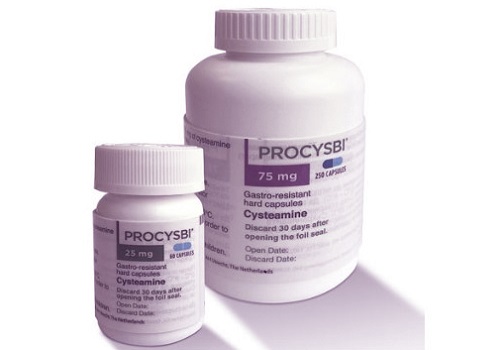Nikhil Prasad Fact checked by:Thailand Medical News Team Oct 29, 2024 5 months, 2 weeks, 2 days, 2 hours, 35 minutes ago
Medical News: Tuberculosis (TB) remains a major global health issue, with over 10 million new cases and approximately 1.3 million deaths each year. With the rise in drug-resistant strains of TB, researchers are searching for alternative therapies. A recent study suggests that cysteamine, an antioxidant, may play a significant role in helping the body control TB by modifying immune responses, rather than directly attacking the bacteria.
 How Cysteamine Could Transform Tuberculosis Treatment and Reduce Lung Damage
What Is Cysteamine?
How Cysteamine Could Transform Tuberculosis Treatment and Reduce Lung Damage
What Is Cysteamine?
Cysteamine, an aminothiol compound, is already approved for treating cystinosis, a rare genetic disorder. It has gained attention due to its diverse biological effects, including anti-inflammatory properties and protection against oxidative stress. Researchers believe these properties could make cysteamine a promising candidate as a host-directed therapy for infectious diseases, including TB. Host-directed therapies aim to improve the immune system's ability to fight infections without relying solely on antibiotics, which could help overcome the challenges posed by antibiotic resistance.
Study Overview and Key Findings
The study, conducted by researchers from the National Institute for Infectious Diseases in Rome and the University of Rome "Tor Vergata," aimed to investigate the impact of cysteamine on immune cells affected by TB. This
Medical News report will focus on the key findings of the study, highlighting the effects of cysteamine on specific immune responses in tuberculosis patients.
The study examined the effects of cysteamine on immune cells from TB patients, individuals with latent TB infection, and healthy controls. Researchers treated immune cells, specifically peripheral blood mononuclear cells (PBMCs), with various concentrations of cysteamine and measured the production of key immune signals, or cytokines, which are known to be crucial in TB defense mechanisms.
Cysteamine’s Impact on T-Cell Responses
The researchers observed that cysteamine, especially at high concentrations, had a noticeable effect on T cells. T cells, particularly Th1 (T-helper cells) and Tc1 (cytotoxic T cells), play essential roles in mounting an immune response against TB. Th1 cells produce cytokines such as interferon-gamma (IFN-γ), tumor necrosis factor (TNF), and interleukin-2 (IL-2), which are critical for fighting TB infections. However, excessive cytokine production can lead to severe inflammation, which, in TB patients, can result in lung tissue damage.
The study demonstrated that cysteamine could reduce the Th1 and Tc1 responses in a dose-dependent manner, meaning higher cysteamine levels led to a more significant decrease in these immune responses. Interestingly, cysteamine decreased the production of IFN-γ, TNF, and IL-2 among TB patients and those with latent TB infection. This response could potentially help prevent the excessive inflammation that can cause lung damage in TB patients, while still allowing the immune system to fight the infection.
&l
t;strong>Apoptosis and Cell Death Induction by Cysteamine
In addition to modulating immune responses, cysteamine was found to influence the survival of certain immune cells. The study found that higher doses of cysteamine could induce apoptosis (a form of programmed cell death) in T cells.
Apoptosis can be a beneficial process, as it allows the body to remove damaged or unnecessary cells. However, excessive apoptosis might weaken the immune system, which could have implications for its use in treating TB.
The researchers noted that apoptosis occurred in a time- and dose-dependent manner. At higher doses, cysteamine led to increased cell death in a relatively short time, but lower doses of cysteamine retained its immune-modulating effects without inducing significant cell death. This finding is critical, as it indicates that dosing may be key in utilizing cysteamine safely as a therapy for TB without compromising immune function.
How Cysteamine Helps Control Inflammation
One of the key insights from the study is that cysteamine's impact on inflammation may be partly due to its inhibition of an enzyme called transglutaminase 2 (TG2). TG2 has been linked to various inflammatory conditions and can activate NF-кB, a protein complex that plays a significant role in controlling immune responses. By inhibiting TG2, cysteamine appears to reduce NF-кB activity, thus lowering inflammation and helping control the immune response. This mechanism could be particularly beneficial in TB, where excessive inflammation can damage lung tissue and worsen the disease.
Potential for Broader Application in Infectious Diseases
Beyond TB, cysteamine’s anti-inflammatory properties and ability to regulate immune responses may make it useful in treating other infections, such as COVID-19. Previous studies have shown that cysteamine can help modulate hyper-inflammation caused by the SARS-CoV-2 virus, making it a promising candidate for managing severe COVID-19 cases. This versatility of cysteamine suggests that it could be a valuable addition to the toolkit for fighting various infectious diseases, particularly those that cause excessive inflammation.
Conclusion
The findings from this study highlight cysteamine’s potential as a host-directed therapy for TB, offering a new approach to managing one of the world’s most persistent infectious diseases. By reducing harmful inflammation and modulating immune responses, cysteamine could help limit tissue damage and improve patient outcomes, especially in drug-resistant TB cases. This research opens doors to further studies on the effectiveness of cysteamine as part of TB treatment regimens.
However, it is important to note that while cysteamine shows promise, its effects on immune cells need to be carefully monitored, particularly at high doses that could induce cell death. Future research, including larger clinical trials, will be essential to determine the optimal dosing and ensure cysteamine’s safety and effectiveness for TB treatment. If successful, cysteamine could become a vital tool in TB management, potentially reducing the reliance on antibiotics and providing a solution to the growing problem of drug-resistant TB.
The study findings were published in the peer-reviewed journal: Frontiers in Immunology.
https://www.frontiersin.org/journals/immunology/articles/10.3389/fimmu.2024.1411827/full
For the latest on Tuberculosis (TB), keep on logging to Thailand
Medical News.
Read Also:
https://www.thailandmedical.news/news/thailand-medical-study-finds-that-treating-covid-19-patients-with-corticosteroids-increases-risk-of-tuberculosis
https://www.thailandmedical.news/news/french-study-finds-that-targeting-dpre1-to-treat-tuberculosis-can-overcome-drug-resistance-issues
